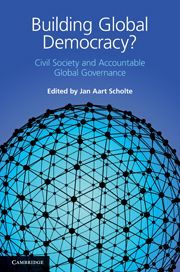Book contents
- Frontmatter
- Contents
- List of figures
- Participants in the Gothenburg Workshop
- List of contributors
- Editor's acknowledgements
- List of abbreviations
- Introduction
- 1 Global governance, accountability and civil society
- 2 Civil society and accountability of the United Nations
- 3 The World Bank and democratic accountability: the role of civil society
- 4 Civil society and IMF accountability
- 5 Civil society and the WTO: contesting accountability
- 6 Civil society and accountability in the Commonwealth
- 7 The Organisation of the Islamic Conference: accountability and civil society
- 8 Civil society and patterns of accountability in the OECD
- 9 Civil society and G8 accountability
- 10 Structuring accountability: civil society and the Asia-Europe Meeting
- 11 Civil society and accountability in the global governance of climate change
- 12 Civil society and accountability promotion in the Global Fund
- 13 Accountability in private global governance: ICANN and civil society
- 14 Civil society and the World Fair Trade Organization: developing responsive accountability
- Conclusion
- Bibliography
- Index
3 - The World Bank and democratic accountability: the role of civil society
Published online by Cambridge University Press: 05 June 2012
- Frontmatter
- Contents
- List of figures
- Participants in the Gothenburg Workshop
- List of contributors
- Editor's acknowledgements
- List of abbreviations
- Introduction
- 1 Global governance, accountability and civil society
- 2 Civil society and accountability of the United Nations
- 3 The World Bank and democratic accountability: the role of civil society
- 4 Civil society and IMF accountability
- 5 Civil society and the WTO: contesting accountability
- 6 Civil society and accountability in the Commonwealth
- 7 The Organisation of the Islamic Conference: accountability and civil society
- 8 Civil society and patterns of accountability in the OECD
- 9 Civil society and G8 accountability
- 10 Structuring accountability: civil society and the Asia-Europe Meeting
- 11 Civil society and accountability in the global governance of climate change
- 12 Civil society and accountability promotion in the Global Fund
- 13 Accountability in private global governance: ICANN and civil society
- 14 Civil society and the World Fair Trade Organization: developing responsive accountability
- Conclusion
- Bibliography
- Index
Summary
Introduction
The World Bank is one of the most visible institutions of global governance, and one of the most frequently targeted by civil society organisations (CSOs). The critiques vary widely. Some see the Bank as an irredeemable instrument of a discredited neoliberal agenda that has increased poverty, indebtedness and environmental destruction. Others view the institution as a necessary actor in global development, but one that is much in need of reform. The tactics of these civil society critics have also varied greatly, ranging from highly visible protests and confrontations to more collaborative efforts with Bank management and staff to promote institutional reform.
What difference has this civil society activism made? More specifically, how and to what extent have civil society actors furthered the accountability of the World Bank to its constituents? This chapter argues that CSOs have been fairly successful in expanding Bank accountability at the project and policy levels, particularly through improved transparency and consultation requirements, the establishment and enforcement of social and environmental safeguards, and the creation of complaint and response mechanisms. However, these civil society impacts have been limited, particularly because accountability to affected peoples has not been well integrated into the incentive structure for Bank staff. Officials continue to be rewarded largely on the basis of considerations that tend to impede meaningful public participation and control (such as streamlining procedures and maximising loan disbursements).
- Type
- Chapter
- Information
- Building Global Democracy?Civil Society and Accountable Global Governance, pp. 58 - 77Publisher: Cambridge University PressPrint publication year: 2011
- 6
- Cited by



